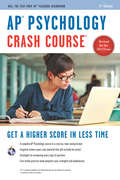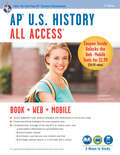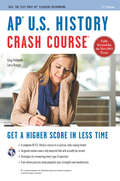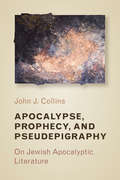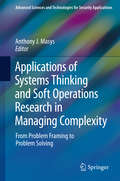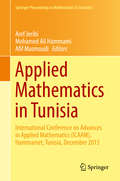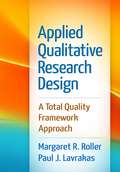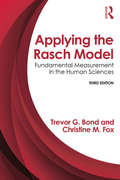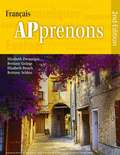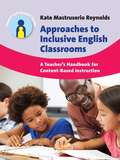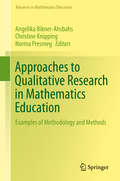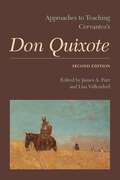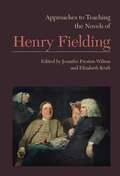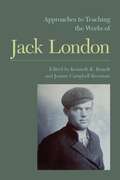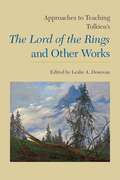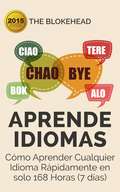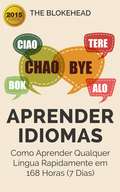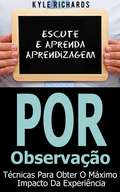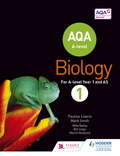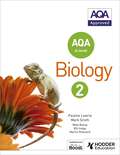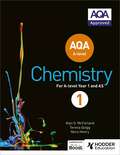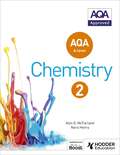- Table View
- List View
AP® Psychology Crash Course Book + Online
by Ms Jessica Flitter Larry Krieger Ms Nancy FentonREA's Crash Course for the AP® Psychology Exam - Gets You a Higher Advanced Placement® Score in Less Time Revised for the 2015 Exam! Crash Course is perfect for the time-crunched student, the last-minute studier, or anyone who wants a refresher on the subject. Are you crunched for time? Have you started studying for your Advanced Placement® Psychology exam yet? How will you memorize everything you need to know before the test? Do you wish there was a fast and easy way to study for the exam AND boost your score? If this sounds like you, don't panic. REA's Crash Course for AP® Psychology is just what you need. Our Crash Course gives you: Targeted, Focused Review - Study Only What You Need to Know Revised for the 2015 AP® Psychology exam, this Crash Course is based on an in-depth analysis of the revised AP® Psychology course description outline and sample AP® test questions. It covers only the information tested on the new exam, so you can make the most of your valuable study time. Expert Test-taking Strategies Crash Course presents detailed, question-level strategies for answering both the multiple-choice and essay questions. By following this advice, you can boost your score in every section of the test. Take REA's Online Practice Exam After studying the material in the Crash Course, go to the online REA Study Center and test what you've learned. Our practice exam features timed testing, detailed explanations of answers, and automatic scoring analysis. The exam is balanced to include every topic and type of question found on the actual AP® exam, so you know you're studying the smart way. Whether you're cramming for the test at the last minute, looking for extra review, or want to study on your own in preparation for the exams - this is the study guide every AP® Psychology student must have. When it's crucial crunch time and your Advanced Placement® exam is just around the corner, you need REA's Crash Course for AP® Psychology!
AP® U.S. History All Access Book + Online + Mobile (Advanced Placement (AP) All Access)
by Gregory Feldmeth Christine CustredAll Access for the AP® U.S. History ExamBook + Web + Mobile Completely Revised for the new 2015 ExamEverything you need to prepare for the Advanced Placement® exam, in a study system built around you! There are many different ways to prepare for an Advanced Placement® exam. What's best for you depends on how much time you have to study and how comfortable you are with the subject matter. To score your highest, you need a system that can be customized to fit you: your schedule, your learning style, and your current level of knowledge. This book, and the online tools that come with it, will help you personalize your AP® U.S. History prep by testing your understanding, pinpointing your weaknesses, and delivering flashcard study materials unique to you. REA's All Access system allows you to create a personalized study plan through three simple steps.Here's how it works:Review the Book: Study the topics tested on the new AP® U.S. History exam and learn proven strategies that will help you tackle any question you may see on test day. Test Yourself and Get Feedback: As you review the book, test yourself with 9 end-of-chapter quizzes and 2 mini-tests. Score reports from your online tests and quizzes give you a fast way to pinpoint what you really know and what you should spend more time studying. Improve Your Score: Armed with your score reports, you can personalize your study plan. Review the parts of the book where you are weakest, and use the REA Study Center to create your own unique e-flashcards, adding to the 100 free cards included with the book. Visit The REA Study Center for a suite of online tools: The best way to personalize your study plan is to get feedback on what you know and what you don't. At the online REA Study Center, you can access three types of assessment: topic-level quizzes, mini-tests, and a full-length practice test. Each of these tools provides true-to-format questions and delivers a detailed score report that follows the topics set by the College Board®. Topic Level Quizzes: Short, 15-minute quizzes are available throughout the review and test your immediate understanding of the topics just covered. Mini-Tests: Two online mini-tests cover what you've studied in each half of the book. These tests are like the actual AP® U.S. History exam, only shorter, and will help you evaluate your overall understanding of the subject.2 Full-Length Practice Tests - 1 in the Book and 1 Online After you have finished reviewing the book, take our full-length practice exams to test what you've learned. These practice tests give you the most complete picture of your strengths and weaknesses. The online exam includes the added benefits of timed testing, automatic scoring, and a detailed score report. Improving Your Score with e-Flashcards: With your score reports from the quizzes and tests, you'll be able to see exactly which AP® U.S. History topics you need to review. Use this information to create your own flashcards for the areas where you are weak. And, because you will create these flashcards through the REA Study Center, you'll be able to access them from any computer or smartphone. REA's All Access test prep is a must-have for students taking the AP® U.S. History exam!
AP® U.S. History Crash Course Book + Online (Advanced Placement (AP) Crash Course)
by Larry Krieger Gregory FeldmethREA's Crash Course for the AP® U.S. History Exam - Gets You a Higher Advanced Placement® Score in Less Time Completely Revised for the 2015 Exam! Crash Course is perfect for the time-crunched student, the last-minute studier, or anyone who wants a refresher on the subject. Are you crunched for time? Have you started studying for your Advanced Placement® U.S. History exam yet? How will you memorize everything you need to know before the test? Do you wish there was a fast and easy way to study for the exam AND boost your score? If this sounds like you, don't panic. REA's Crash Course for AP® U.S. History is just what you need. Our Crash Course gives you: Targeted, Focused Review - Study Only What You Need to Know Fully revised for the 2015 AP® U.S. History exam, this Crash Course is based on an in-depth analysis of the revised AP® U.S. History course description outline and sample AP® test questions. It covers only the information tested on the new exam, so you can make the most of your valuable study time. Expert Test-taking Strategies Crash Course presents detailed, question-level strategies for answering both the multiple-choice and essay questions. By following this advice, you can boost your score in every section of the test. Take REA's Online Practice Exam After studying the material in the Crash Course, go to the online REA Study Center and test what you've learned. Our practice exam features timed testing, detailed explanations of answers, and automatic scoring analysis. The exam is balanced to include every topic and type of question found on the actual AP® exam, so you know you're studying the smart way. Whether you're cramming for the test at the last minute, looking for extra review, or want to study on your own in preparation for the exams - this is the study guide every AP® U.S. History student must have. When it's crucial crunch time and your Advanced Placement® exam is just around the corner, you need REA's Crash Course for AP® U.S. History!
Apocalypse, Prophecy, and Pseudepigraphy: On Jewish Apocalyptic Literature
by John J. CollinsA highly regarded expert on the Jewish apocalyptic tradition, John J. Collins has written extensively on the subject. Nineteen of his essays written over the last fifteen years, including previously unpublished contributions, are brought together for the first time in this volume. Its thematic essays organized in five sections, Apocalypse, Prophecy, and Pseudepigraphy complements and enriches Collins’s well-known book The Apocalyptic Imagination.
Applications of Systems Thinking and Soft Operations Research in Managing Complexity: From Problem Framing to Problem Solving (Advanced Sciences and Technologies for Security Applications)
by Anthony J. MasysThis book captures current trends and developments in the field of systems thinking and soft operations research which can be applied to solve today's problems of dynamic complexity and interdependency. Such 'wicked problems' and messes are seemingly intractable problems characterized as value-laden, ambiguous, and unstable, that resist being tamed by classical problem solving. Actions and interventions associated with this complex problem space can have highly unpredictable and unintended consequences. Examples of such complex problems include health care reform, global climate change, transnational serious and organized crime, terrorism, homeland security, human security, disaster management, and humanitarian aid. Moving towards the development of solutions to these complex problem spaces depends on the lens we use to examine them and how we frame the problem. It will be shown that systems thinking and soft operations research has had great success in contributing to the management of complexity.
Applied Mathematics in Tunisia: International Conference on Advances in Applied Mathematics (ICAAM), Hammamet, Tunisia, December 2013 (Springer Proceedings in Mathematics & Statistics #131)
by Aref Jeribi Mohamed Ali Hammami Afif MasmoudiThis contributed volume presents some recent theoretical advances in mathematics and its applications in various areas of science and technology. Written by internationally recognized scientists and researchers, the chapters in this book are based on talks given at the International Conference on Advances in Applied Mathematics (ICAAM), which took place December 16-19, 2013, in Hammamet, Tunisia. Topics discussed at the conference included spectral theory, operator theory, optimization, numerical analysis, ordinary and partial differential equations, dynamical systems, control theory, probability, and statistics. These proceedings aim to foster and develop further growth in all areas of applied mathematics.
Applied Qualitative Research Design
by Paul J. Lavrakas Margaret R. RollerThis unique text provides a comprehensive framework for creating, managing, and interpreting qualitative research studies that yield valid and useful information. Examples of studies from a wide range of disciplines illustrate the strengths, limitations, and applications of the primary qualitative methods: in-depth interviews, focus group discussions, ethnography, content analysis, and case study and narrative research. Following a consistent format, chapters show students and researchers how to implement each method within a paradigm-neutral and flexible Total Quality Framework (TQF) comprising four interrelated components: Credibility, Analyzability, Transparency, and Usefulness. Unlike other texts that relegate quality issues to one or two chapters, detailed discussions of such crucial topics as construct validity, interresearcher reliability, researcher bias, and verification strategies are featured throughout. The book also addresses applications of the TQF to the writing, review, and evaluation of qualitative research proposals and manuscripts. Pedagogical Features: *Summary tables that highlight important content, such as the application of a method to vulnerable or hard-to-reach populations. *Case studies that illustrate TQF standards in practice for each method. *Guidelines for effective documentation (via thick descriptions) of each type of study. *End-of-chapter discussion topics, exercises, and suggested further reading and Web resources. *Chapters open with a preview and close with a bulleted summary of key ideas. *Extensive glossary.
Applying the Rasch Model: Fundamental Measurement in the Human Sciences, Third Edition
by Trevor Bond Christine M. FoxCited over 1900 times, this classic text facilitates a deep understanding of the Rasch model. The authors review the crucial properties of the model and demonstrate its use with a variety of examples from education, psychology, and health. A glossary and numerous illustrations aid the reader's understanding. Readers learn how to apply Rasch analysis so they can perform their own analyses and interpret the results. The authors present an accessible overview that does not require a mathematical background. Highlights of the new edition include: -More learning tools to strengthen readers’ understanding including chapter introductions, boldfaced key terms, chapter summaries, activities, and suggested readings. -Divided chapters (4, 6, 7 & 8) into basic and extended understanding sections so readers can select the level most appropriate for their needs and to provide more in-depth investigations of key topics. -A website at www.routledge.com/9780415833424 that features free Rasch software, data sets, an Invariance worksheet, detailed instructions for key analyses, and links to related sources. -Greater emphasis on the role of Rasch measurement as a priori in the construction of scales and its use post hoc to reveal the extent to which interval scale measurement is instantiated in existing data sets. -Emphasizes the importance of interval level measurement data and demonstrates how Rasch measurement is used to examine measurement invariance. -Insights from other Rasch scholars via innovative applications (Ch. 9). -Extended discussion of invariance now reviews DIF, DPF, and anchoring (ch. 5). -Revised Rating Scale Model material now based on the analysis of the CEAQ (ch.6). -Clarifies the relationships between Rasch measurement, True Score Theory, and Item Response Theory by reviewing their commonalities and differences (Ch.13). -Provides more detail on how to conduct a Rasch analysis so readers can use the techniques on their own (Appendix B). Intended as a text for graduate courses in measurement, item response theory, (advanced) research methods or quantitative analysis taught in psychology, education, human development, business, and other social and health sciences, professionals in these areas also appreciate the book‘s accessible introduction.
Apprenons: Francais
by Elizabeth Zwanziger Brittany Goings Elizabeth Rench Brittany Selden GriffinNIMAC-sourced textbook
Approaches to Inclusive English Classrooms
by Kate Mastruserio ReynoldsThis book provides educators with an accessible guide to best practices concerning content-based instruction (CBI) models and their use in English learner inclusive classrooms. The author effectively bridges the gap between theory and practice with a critical analysis of practical examples and diverse strategies for the inclusion of English learners into K-12 general education courses. The book also raises controversial questions regarding who is qualified to teach English learners and who is responsible for doing so, looking at the difficulties faced by both general educators and ESL teachers in inclusive classrooms. By providing a lens through which both ESL teachers and general educators are able to analyze, compare and contrast a range of widely-employed CBI methods, this book allows teachers to make informed decisions in their EL program development and work with English learners in K-12 schools.
Approaches to Qualitative Research in Mathematics Education: Examples of Methodology and Methods (Advances in Mathematics Education)
by Norma Presmeg Angelika Bikner-Ahsbahs Christine KnippingThis volume documents a range of qualitative research approaches emerged within mathematics education over the last three decades, whilst at the same time revealing their underlying methodologies. Continuing the discussion as begun in the two 2003 ZDM issues dedicated to qualitative empirical methods, this book presents astate of the art overview on qualitative research in mathematics education and beyond. The structure of the book allows the reader to use it as an actual guide for the selection of an appropriate methodology, on a basis of both theoretical depth and practical implications. The methods and examples illustrate how different methodologies come to life when applied to a specific question in a specific context. Many of the methodologies described are also applicable outside mathematics education, but the examples provided are chosen so as to situate the approach in a mathematical context.
Approaches to Teaching Cervantes's Don Quixote (Approaches to Teaching World Literature #134)
by James A. Parr and Lisa VollendorfThis second edition of Approaches to Teaching Cervantes'sDon Quixote highlights dramatic changes in pedagogy and scholarship in the last thirty years: today, critics and teachers acknowledge that subject position, cultural identity, and political motivations afford multiple perspectives on the novel, and they examine both literary and sociohistorical contextualization with fresh eyes.Part 1, "Materials," contains information about editions of Don Quixote, a history and review of the English translations, and a survey of critical studies and Internet resources. In part 2, "Approaches," essays cover such topics as the Moors of Spain in Cervantes's time; using film and fine art to teach his novel; and how to incorporate psychoanalytic theory, satire, science and technology, gender, role-playing, and other topics and techniques in a range of twenty-first-century classroom settings.
Approaches to Teaching the Novels of Henry Fielding (Approaches to Teaching World Literature #139)
by Jennifer Preston Wilson and Elizabeth KraftThe works of Henry Fielding, though written nearly three hundred years ago, retain their sense of comedy and innovation in the face of tradition, and they easily engage the twenty-first-century student with many aspects of eighteenth-century life: travel, inns, masquerades, political and religious factions, the '45, prisons and the legal system, gender ideals and realities, social class.Part 1 of this volume, "Materials," discusses the available editions of Joseph Andrews, Tom Jones, Shamela, Jonathan Wild, and Amelia; suggests useful critical and contextual works for teaching them; and recommends helpful audiovisual and electronic resources. The essays of part 2, "Approaches," demonstrate that many of the methods and models used for one novel-- the romance tradition, Fielding's legal and journalistic writing, his techniques as a playwright, the ideas of Machiavelli-- can be adapted to others.
Approaches to Teaching the Works of Jack London (Approaches to Teaching World Literature #132)
by Jeanne Campbell ReesmanA prolific and enduringly popular author--and an icon of American fiction--Jack London is a rewarding choice for inclusion in classrooms from middle school to graduate programs. London's biography and the role played by celebrity have garnered considerable attention, but the breadth of his personal experiences and political views and the many historical and cultural contexts that shaped his work are key to gaining a nuanced view of London's corpus of works, as this volume's wide-ranging perspectives and examples attest.The first section of this volume, "Materials," surveys the many resources available for teaching London, including editions of his works, sources for his photography, and audiovisual aids. In part 2, "Approaches," contributors recommend practices for teaching London's works through the lenses of socialism and class, race, gender, ecocriticism and animal studies, theories of evolution, legal theory, and regional history, both in frequently taught texts such as The Call of the Wild, "To Build a Fire," and Martin Eden and in his lesser-known works.
Approaches to Teaching Tolkien's The Lord of the Rings and Other Works (Approaches to Teaching World Literature #136)
by The Modern Language Association of AmericaA philologist and medieval scholar, J. R. R. Tolkien never intended to write immensely popular literature that would challenge traditional ideas about the nature of great literature and that was worthy of study in colleges across the world. He set out only to write a good story, the kind of story he and his friends would enjoy reading. In The Hobbit and in The Lord of the Rings, Tolkien created an entire world informed by his vast knowledge of mythology, languages, and medieval literature. In the 1960s, his books unexpectedly gained cult status with a new generation of young, countercultural readers. Today, the readership for Tolkien's absorbing secondary world--filled with monsters, magic, adventure, sacrifice, and heroism--continues to grow.Part 1 of this volume, "Materials," introduces instructors to the rich array of resources available for teaching Tolkien, including editions and criticism of his fiction and scholarship, historical material on his life and times, audiovisual materials, and film adaptations of his fiction. The essays in part 2, "Approaches," help instructors introduce students to critical debates around Tolkien's work, its sources, its influence, and its connection to ecology, religion, and science. Contributors draw on interdisciplinary approaches to outline strategies for teaching Tolkien in a wide variety of classroom contexts.
Aprende Idiomas/ Cómo Aprender Cualquier Idioma Rápidamente en solo 168 Horas (7 días)
by The BlokeheadEste libro está hecho para aquellos que les gustaría aprender un idioma extranjero pero nunca antes lo han intentado. También es para los que han intentado pero se han rendido y, sin embargo, desean hacerlo mejor esta vez. Aprender un idioma extranjero es tan hermoso como retador. Aprender un idioma es diferente a aprender otras disciplinas, como matemáticas, geografía o escritura de poesía. No puedes simplemente sentarte y memorizar cientos de páginas y fórmulas y luego levantarte y hablar el idioma con fluidez y confianza. Requiere tiempo, paciencia, llenarse de recursos, creatividad y trabajo duro. En los próximos siete días, este libro te guiará a través de un proceso muy especial y efectivo para aprender idiomas. Al final de la semana, podrás expresarte en tu idioma objetivo mejor de lo que lo has hecho antes.
Aprender Idiomas (7 Dias): Como Aprender Qualquer Língua Rapidamente em 168 Horas (7 Dias)
by The BlokeheadAprender um idioma estrangeiro é bonito, mas também desafiador. O aprendizado de uma língua é diferente do de outras disciplinas, tais como matemática, geografia, ou redação poética. Você simplesmente não consegue sentar-se e memorizar centenas de páginas e fórmulas, levantar-se e sair por aí falando a língua com fluência e confiança. Isso leva tempo, e requer paciência, criatividade, desenvoltura, e trabalho duro. Nos próximos 7 dias, este livro guiará você num processo especial e efetivo de aprendizado de idiomas.
Aprendizagem Por Observação - Técnicas Para Obter O Máximo Impacto Da Experiência
by Kyle Richards Luciana SchreiberA Aprendizagem por Observação é um processo onde você passa algum tempo com um profissional na carreira do seu interesse, com o único objetivo de ser capaz de aprender e explorar oportunidades de carreira. Como você faz isto? Como você consegue oportunidades de aprendizagem por observação? Como você consegue tirar o máximo proveito da experiência? Quando você aprende por observação, você consegue a melhor chance de ver a realidade de estar naquela atividade. Você consegue fazer perguntas, e observar as atividades do dia a dia de pessoas envolvidas naquela carreira. A aprendizagem por observação pode ser a ferramenta mais ponderosa e efetiva disponível na exploração de carreira. Você se beneficiaria enormemente de uma situação de aprendizado por observação se você for um estudante ou considerando uma mudança de carreira. Com os custos da educação superior subindo, aprendendo a fazer um aprendizado de observação de sucesso podia fazer você economizar literalmente milhares de dólares, muito tempo e um possível erro na escolha da carreira. Faça o download de sua cópia agora para descobrir se você consegue tirar o máximo impacto da experiência.
AQA A Level Biology Student Book 1 (AQA A level Science #22)
by Pauline Lowrie Mark SmithExam Board: AQALevel: AS/A-levelSubject: BiologyFirst Teaching: September 2015First Exam: June 2016AQA ApprovedDevelop students' experimental, analytical and evaluation skills with contemporary and topical biology examples, practical assessment guidance and differentiated end of topic questions, with this AQA Year 1 student book (includes AS-level).- Provides support for all 12 required practicals with plenty of activities and data analysis guidance- Develops understanding with engaging and contemporary examples to help students apply their knowledge, analyse data and evaluate findings- Gives detailed guidance and examples of method with a dedicated 'Maths in Biology' chapter and mathematical support throughout to consolidate learning- Offers regular opportunities to test understanding with Test Yourself Questions, Differentiated End of Topic Questions and Stretch and Challenge Questions- Supports exam preparation with synoptic questions, revision tips and skills- Develops understanding with free online access to 'Test yourself' answers and an extended glossary.
AQA A Level Biology Student Book 2
by Mark Smith Pauline LowrieExam Board: AQALevel: AS/A-levelSubject: BiologyFirst Teaching: September 2015First Exam: June 2017Develop students' experimental, analytical and evaluation skills with contemporary and topical biology examples, practical assessment guidance and differentiated end of topic questions, with this AQA Year 2 student book.- Provides support for all 12 required practicals with plenty of activities and data analysis guidance- Develops understanding with engaging and contemporary examples to help students apply their knowledge, analyse data and evaluate findings- Gives detailed guidance and examples of method with a dedicated 'Maths in Biology' chapter and mathematical support throughout to consolidate learning- Offers regular opportunities to test understanding with Test Yourself Questions, Differentiated End of Topic Questions and Stretch and Challenge Questions- Supports exam preparation with synoptic questions, revision tips and skills-Develops understanding with free online access to 'Test yourself' answers and an extended glossary.
AQA A Level Biology Student Book 2
by Mark Smith Pauline LowrieExam Board: AQALevel: AS/A-levelSubject: BiologyFirst Teaching: September 2015First Exam: June 2017Develop students' experimental, analytical and evaluation skills with contemporary and topical biology examples, practical assessment guidance and differentiated end of topic questions, with this AQA Year 2 student book.- Provides support for all 12 required practicals with plenty of activities and data analysis guidance- Develops understanding with engaging and contemporary examples to help students apply their knowledge, analyse data and evaluate findings- Gives detailed guidance and examples of method with a dedicated 'Maths in Biology' chapter and mathematical support throughout to consolidate learning- Offers regular opportunities to test understanding with Test Yourself Questions, Differentiated End of Topic Questions and Stretch and Challenge Questions- Supports exam preparation with synoptic questions, revision tips and skills-Develops understanding with free online access to 'Test yourself' answers and an extended glossary.
AQA A Level Chemistry Student Book 1
by Alyn G. McFarland Teresa Quigg Nora HenryExam Board: AQALevel: AS/A-levelSubject: ChemistryFirst Teaching: September 2015First Exam: June 2016AQA ApprovedHelp students to apply and develop their knowledge, progressing from basic concepts to more complicated Chemistry, with worked examples, practical activities and mathematical support throughout- Provides support for all 12 required practicals with activities that introduce practical work and other experimental investigations in Chemistry- Offers detailed examples to help students get to grips with difficult concepts such as Physical Chemistry calculations- Mathematical skills are integrated throughout the book and all summarised in one chapter for easy reference- Allows you to easily measure progression with Differentiated End of Topic questions and Test Yourself Questions-Develops understanding with free online access to 'Test yourself' answers and an extended glossary.AQA A-level Chemistry Year 1 includes AS-level.
AQA A Level Chemistry Student Book 1
by Alyn G. McFarland Teresa Quigg Nora HenryExam Board: AQALevel: AS/A-levelSubject: ChemistryFirst Teaching: September 2015First Exam: June 2016AQA ApprovedHelp students to apply and develop their knowledge, progressing from basic concepts to more complicated Chemistry, with worked examples, practical activities and mathematical support throughout- Provides support for all 12 required practicals with activities that introduce practical work and other experimental investigations in Chemistry- Offers detailed examples to help students get to grips with difficult concepts such as Physical Chemistry calculations- Mathematical skills are integrated throughout the book and all summarised in one chapter for easy reference- Allows you to easily measure progression with Differentiated End of Topic questions and Test Yourself Questions-Develops understanding with free online access to 'Test yourself' answers and an extended glossary.AQA A-level Chemistry Year 1 includes AS-level.
AQA A Level Chemistry Student Book 2
by Alyn G. McFarland Nora HenryExam Board: AQALevel: AS/A-levelSubject: ChemistryFirst Teaching: September 2015First Exam: June 2017AQA ApprovedHelp students to apply and develop their knowledge, progressing from basic concepts to more complicated Chemistry, with worked examples, practical activities and mathematical support throughout. - Provides support for all 12 required practicals with activities that introduce practical work and other experimental investigations in Chemistry- Offers detailed examples to help students get to grips with difficult concepts such as Physical Chemistry calculations- Mathematical skills are integrated throughout the book and all summarised in one chapter for easy reference- Allows you to easily measure progression with Differentiated End of Topic questions and Test Yourself Questions- Develops understanding with free online access to 'Test yourself' answers and an extended glossary.
AQA A Level Chemistry Student Book 2
by Alyn G. McFarland Nora HenryExam Board: AQALevel: AS/A-levelSubject: ChemistryFirst Teaching: September 2015First Exam: June 2017AQA ApprovedHelp students to apply and develop their knowledge, progressing from basic concepts to more complicated Chemistry, with worked examples, practical activities and mathematical support throughout. - Provides support for all 12 required practicals with activities that introduce practical work and other experimental investigations in Chemistry- Offers detailed examples to help students get to grips with difficult concepts such as Physical Chemistry calculations- Mathematical skills are integrated throughout the book and all summarised in one chapter for easy reference- Allows you to easily measure progression with Differentiated End of Topic questions and Test Yourself Questions- Develops understanding with free online access to 'Test yourself' answers and an extended glossary.
